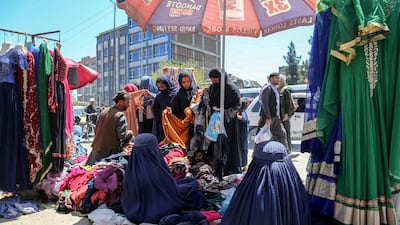Afghan women say they fear worse is to come after the Taliban introduced a morality law this week that formalises and expands on the increasingly severe restrictions imposed on them since the hardline group seized power three years ago.
The law introduced on Wednesday by the Taliban’s Ministry of Justice is based on a decree by its supreme leader, Haibatullah Akhundzada, and will be enforced by its Ministry of Preventing Vice and Promoting Virtue.
Many of its 35 articles mandate more rigorous adherence to rules already in force, such as the requirement for women to cover their bodies and faces.
“Women were already adhering to strict dress codes, including wearing hijabs, long clothing, and even masks,” said Sara Wahedi, chief executive of Afghan tech company Ehtesab, and a vocal critic of Taliban policies. “The fact that the supreme leader felt the need to codify this further reveals that the Taliban’s ultimate goal is the systematic erasure of women.”
The law also introduces new restrictions. For instance, women are not allowed to speak loudly, or to sing, recite or read aloud in public, since the sound of their voices is considered too intimate. Some provisions apply to men, such as Article 22 that forbids them from wearing a tie or shaving their beards, which are required to be of “fist length”.
The Taliban began imposing bans on women’s rights and movement soon after seizing power in August 2021. Young women and girls have been banned from attending universities and secondary schools; women were forbidden from many jobs in the public and private sector, and allowed to travel only in the company of a male guardian.
“They do not want to see women in the public, and I think they have caught wind of the fact that women have been protesting by manoeuvring through all these restrictions, and that infuriates them even more,” said Ms Wahedi, who lives outside the country.
An activist from Kabul who asked to be identified only as Amina said the Taliban were seeking to close off any way of working around their rules.
“Women have been consistently facing challenges from the Taliban since they took over. But we have also been finding new and unique ways to resist and fight these problems, to protest, to work or study,” she said.
“We look for new ways to simply survive, but they find ways to limit women further.”
Systemic oppression

Ms Wahedi fears the new law has opened the door for women to be exploited. Although it lists offences, these are not clearly defined and the punishments for each are not specified.
“Now that this decree is codified, the Taliban has given the morality police the authority to interpret and enforce it as they see fit,” she said.
“This means the law is now at the discretion of individual men who can decide how to execute it – whether that results in imprisonment or physical punishment is unclear.”
The result, she says, is an “unpredictable and deeply disturbing” environment for women in the country. “The complete lack of protection for women is terrifying.”
The Taliban this week barred entry to Richard Bennett, the UN’s special rapporteur on Afghanistan, who issued a scathing report last month on the hardline group's treatment of women, calling it a “crime against humanity”.
Ms Wahedi said Mr Bennett being barred from the country felt like a significant blow.
“I didn’t think things could worsen after such a clear message to the international community. Yet, less than a day later, the new decrees were announced, and I felt sick to my stomach, similar to the education ban announcement,” she said.
New law, same old Taliban
The new laws are reminiscent of the Taliban's first time in power in the 1990s, when women were forbidden from participating in public, political and economic life. The group promised a new approach to women’s rights when manoeuvring for a return to power, before they seized control by force in August 2021.
The reality is very different, says Sahar Fetrat, researcher with the Women’s Rights Division at Human Rights Watch.
“We have repeatedly witnessed how deeply rooted the Taliban’s misogyny is, stripping women of their personhood at every turn,” said Ms Fetrat. “The Taliban are consistently unlocking new levels of hatred toward women.”
She said the new rules “persistently sexualise and objectify women” and were a pretext to confine them to their homes. “They strive to dehumanise women to the point of complete suffocation – all while the world watches,” she said.
The burden is heavier for women such as Amina who are the providers for their households. “I was a university student when the Taliban took over in 2021. I didn’t get to finish my degree because of the education ban,” she said. “Now I can’t work to support my family of eight people.”
With no male members for her family to fall back on, her inability to provide for them is causing her severe mental trauma, she said. In a different life, Amina had wanted to pursue a career in politics.
“But women in Afghanistan have no choices left; either become beggars on the streets to support their families or end their lives,” she said, choking back tears.








